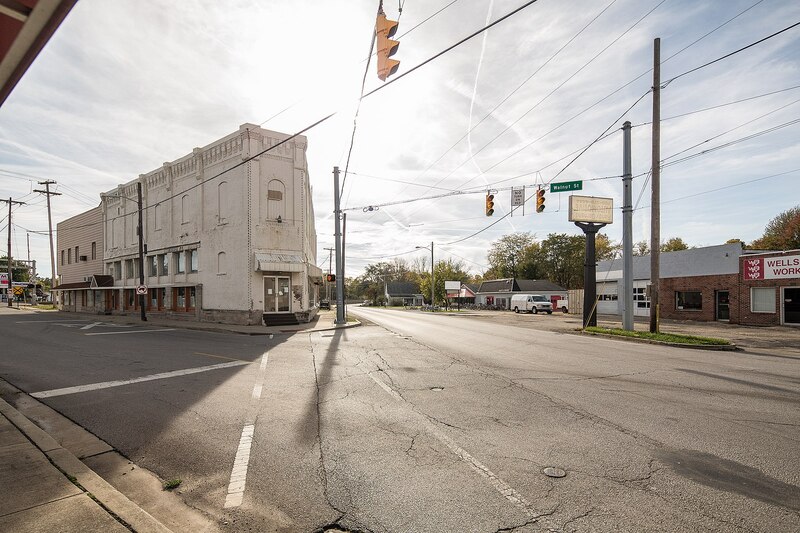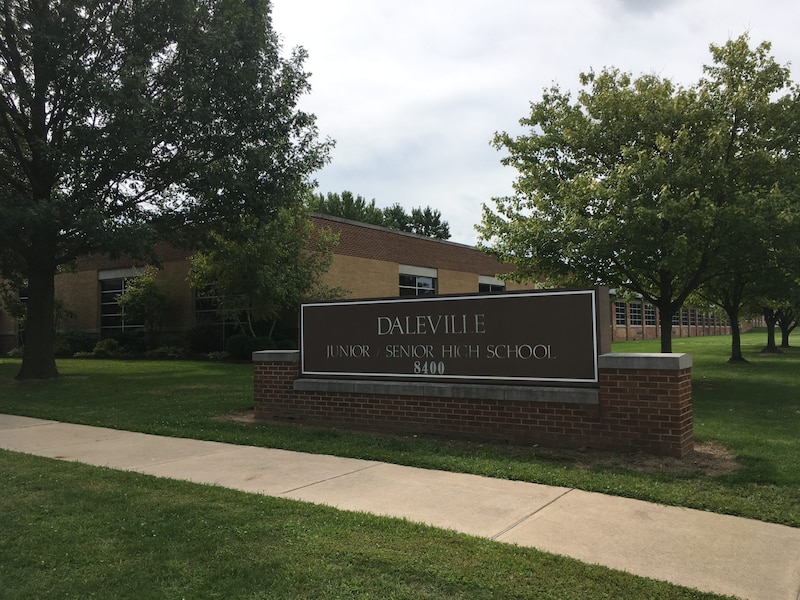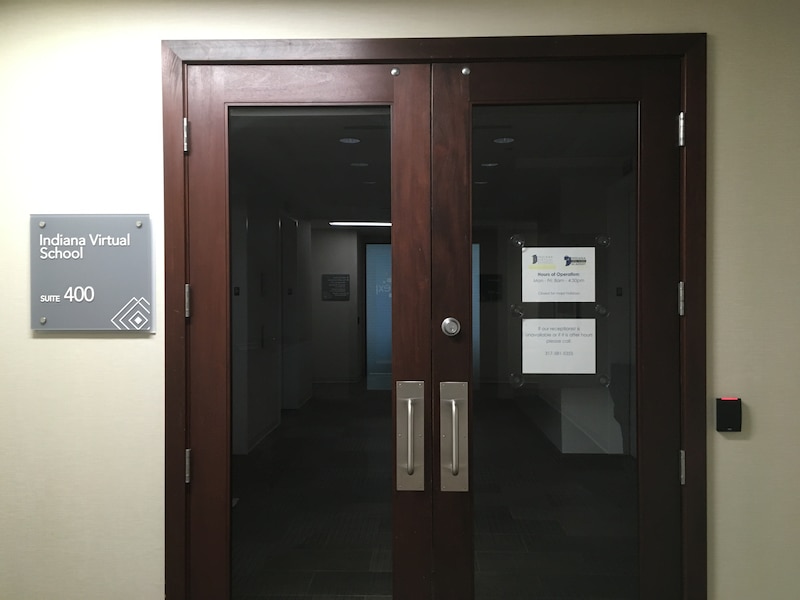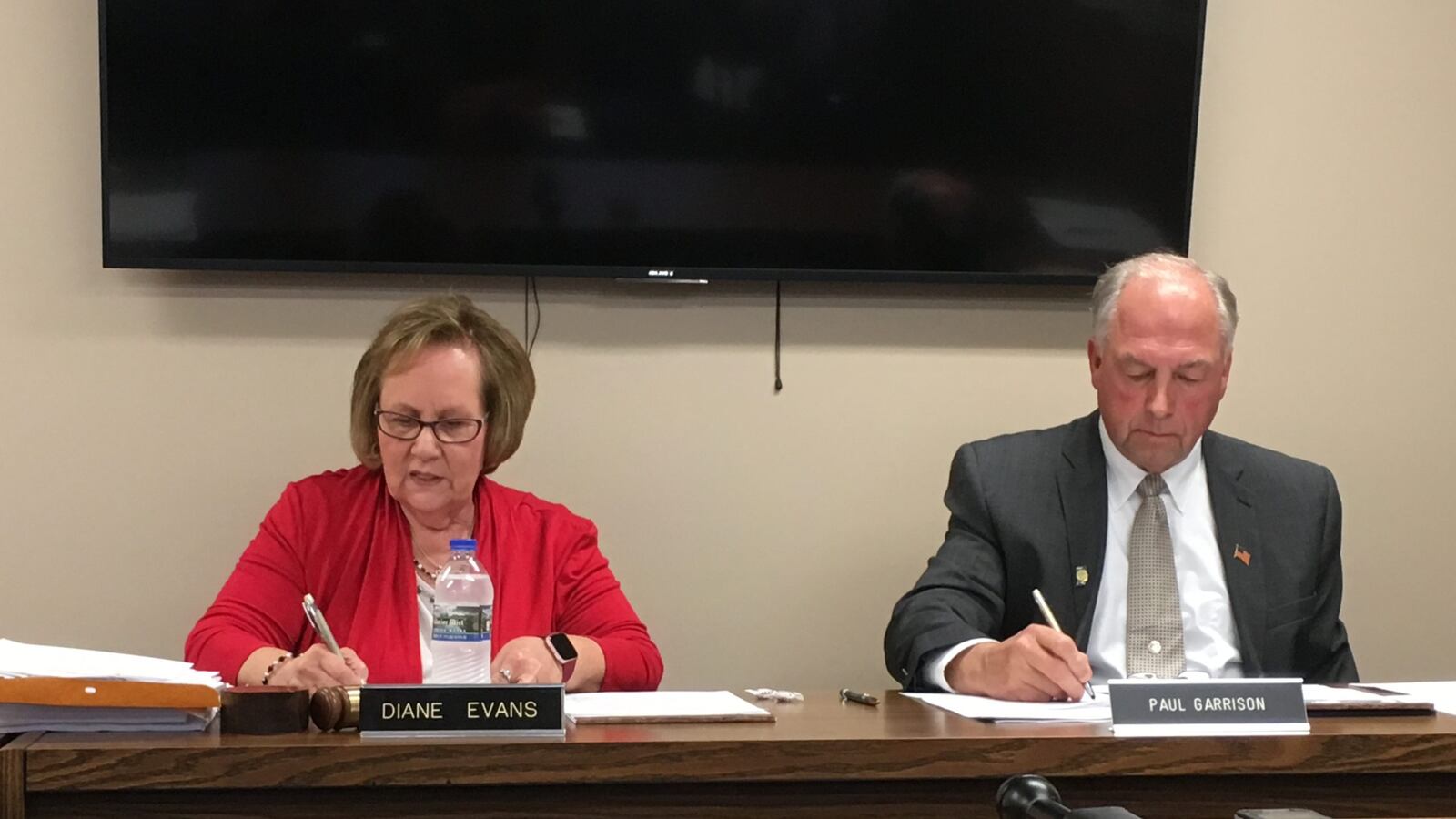When Indiana’s largest charter network collapsed earlier this year after an enrollment scandal that triggered state and federal investigations, the resulting mess left hundreds of students scrambling for transcripts, dozens of teachers unpaid, and $40 million still owed to the state.
The downfall of Indiana Virtual School and Indiana Virtual Pathways Academy also placed under the microscope Daleville Community Schools, a tiny rural district that runs just two brick-and-mortar schools serving fewer than 1,000 students in total.
Despite having no experience as a charter authorizer, Daleville took on an oversight role when Indiana Virtual School opened in 2011 and, over the years, accepted more than $3.2 million in state funding to monitor them and ensure their success.
Daleville officials saw it as a unique opportunity to help students who were failing in traditional schools or those who had medical conditions and needed flexible schedules. But the district struggled to rein in the fast-growing, low-performing virtual charter schools, which in July were found by auditors to be artificially doubling their enrollment and collecting state funding for thousands of students who they weren’t educating.
A Chalkbeat review of thousands of pages of charter records and multiple interviews with the authorizing school district show that, until recently, Daleville relied largely on informal or undocumented conversations to monitor Indiana Virtual School.
“Call us naive, but I think we were trusting educators to do the right thing,” Daleville Superintendent Paul Garrison said in a recent interview, referring to the charter operator.
“We were working with people that we trusted, that had the same love and outlook and concern for the kids that they were serving that we had,” Garrison explained. “Well, that’s how we looked at them. We assumed — maybe falsely.”
Virtual school officials did not respond to multiple requests for comment for this story. They have previously denied wrongdoing through an attorney. That attorney also didn’t respond to requests, and it is not clear whether she is representing the schools anymore.
Daleville’s inability to prevent the alleged abuse of public dollars has become a cautionary tale for charter authorizers, and for small districts with ambitions that exceed their expertise or bandwidth. The situation has led to a new state law this year that prevents districts from being in charge of virtual charter schools and has prompted state leaders to call for more safeguards.
Marcie Brown Carter, executive director of the Indiana Charter School Network, criticized the district for letting problems persist for too long, leading to the schools’ sloppy shutdown: “That’s inexcusable. It’s been horrible for the students and families and employees involved.”
Daleville officials say they did the best they could in uncharted territory. In defending their oversight, they pointed to their data analysis that uncovered the schools’ alleged misdeeds and called on the state to better regulate virtual schools, including defining what virtual attendance should look like.
The district says it raised concerns about academics with the virtual school from the start. But emails show Daleville administrators brushed off concerns raised in a 2017 Chalkbeat investigation into how Indiana Virtual School was spending little on teachers while pumping public dollars into lucrative contracts with businesses tied to the school’s founder and his son — financial arrangements that are now being investigated by state and federal agencies.
Daleville’s first formal evaluation of Indiana Virtual School later flagged those same issues and raised several others, prompting the district to create a school improvement plan. However, it wasn’t until early 2019 — three years after the virtual schools allegedly inflated enrollment — that Daleville took steps to shut down Indiana Virtual School and Indiana Virtual Pathways Academy.

An optimistic but troubled start
Situated about 50 miles northeast of Indianapolis, Daleville is a quiet rural railroad town, home to fewer than 1,700 people. Those driving along I-69 might notice it as an exit on the highway, offering gas stations and fast food. Its own residents have described Daleville as a place that “lacks an identity.”
The Daleville school district offices are inside a converted house with front windows looking out onto the junior-senior high school, home of the Daleville Broncos. A C-rated district, Daleville serves almost all white students, and just under half of them qualify for free or reduced-price meals.
Four out of five school board members have served in their roles for at least 15 years; two of them have been on the board since the 1980s. Garrison, the longtime superintendent, sometimes signs emails with, “Blessings.”
Daleville is not the kind of district that would usually attract statewide attention. Critics would later argue, too, that it wasn’t the kind of district that had the capacity or the knowledge to effectively monitor such large and unconventional charter schools — schools without walls and with students scattered across the state taking classes online.
Back in 2011, Daleville had “a natural interest” in helping to launch Indiana Virtual School, Garrison said, because officials could see from its own schools how some students needed an alternative to traditional classrooms. Enthusiastic about pioneering a new way of learning, Daleville administrators wanted to be part of the growing national conversations on virtual schools. Across the country, virtual schools — where students take all or most of their classes online — were becoming increasingly popular options, even as they were linked to poor academic outcomes.
Indiana Virtual School also provided another benefit: money. The district wanted to use its oversight fees to upgrade its technology and provide supplemental online courses for students at its two district schools — perks that administrators said also helped them monitor Indiana Virtual School.
But Indiana Virtual School experienced problems from the start. There were operational issues, such as occasionally missing teachers’ paychecks and administering state exams incorrectly, and there were academics ones, including consistently low state test scores. Virtual school officials have in the past publicly contended that those results were a reflection of its unconventional students, many of whom had fallen behind at other schools. Online schools, they said, shouldn’t be judged by the same metrics as traditional ones.
Beginning in 2011, Daleville had checklists to evaluate Indiana Virtual School’s academics, finances, and operations. Daleville officials said they were concerned about the school’s academic performance and were constantly pressing for improvements. But there’s little documentation of these efforts or the issues they brought to light.
In 2015, despite its reservations about weak academics, Daleville renewed Indiana Virtual School’s charter for five years. No public document explains how they assessed the school’s performance or their decision to renew the charter, though Daleville officials say they were optimistic after the longtime Indiana educator Percy Clark signed on to lead the virtual school.
Optimism aside, Indiana Virtual School wasn’t showing significant academic improvement by 2017. Its statewide enrollment had grown substantially, but passing rates on standardized tests remained far below state average. The school had the lowest graduation rate out of all public schools in the state that year. It had received two consecutive F grades from the state and was about to earn its third.
That’s when virtual school officials came to Daleville with a plan to open a second school.

Ballooning problems
The second school, Indiana Virtual Pathways Academy, was supposed to fix the problems at the first school. It would provide alternative education pathways through internships and industry certifications, which officials hoped would re-engage struggling students who had grown disenchanted with school.
The school board unanimously approved the proposal in 2017, making Indiana Virtual Pathways Academy the second virtual charter school under Daleville’s oversight. Meeting minutes don’t describe any discussion on the matter prior to the vote.
Garrison said he had been hopeful that Indiana Virtual Pathways Academy would solve the academic issues. Even now, he still thinks the model could prove the potential of online education: “Our thought process at the time was, wow, if they do all of this, in our best guess, this is going to succeed. And I still believe that.”
A few months later, Chalkbeat published an in-depth investigation into Indiana Virtual School. It highlighted the school’s academic problems and raised questions over the school’s spending of millions in state funding.
In emails to the virtual schools, Daleville officials discounted the story.
Garrison praised Clark, the virtual schools superintendent, for sending an email to the staff calling the investigation an attempt to “smear us.”
“I applaud you on your message,” Garrison wrote to Clark, asking for student success stories to send to the Daleville school board to “expose a totally different view of the school” than what the Chalkbeat investigation had described.
Around the same time, Daleville conducted its first formal evaluation of Indiana Virtual School. It paid a Fort Wayne company to develop a customized rubric to fit the nontraditional school, weighing factors like the personalization of education, not just test scores.
The review raised many of the same issues as the Chalkbeat investigation. But it also revealed more significant concerns, according to documents, including that Indiana Virtual School wasn’t regularly checking which students were inactive despite knowing many students were habitually truant.
Daleville officials, while publicly supportive of the schools, say behind the scenes, they were growing increasingly skeptical of Indiana Virtual School’s rosy claims about how their students were flourishing. They wanted to know how many credits students were earning, and emails show they campaigned for access to the school’s data.
“As we look back, you got a lot of different excuses and reasons, and the difficulties in doing this or that were explained pretty heavy,” Garrison said.
Daleville officials have often portrayed their relationship with the online schools as one of uneven power. They said they were bound by their contracts with the schools — and their requests for more data were ignored.
“We had nothing available except what they gave us,” Garrison said. “That was our frustration that whole time — getting information that we could check out and verify.”
Charter experts say such a dynamic could signal a weak charter contract. It also shows one of the disadvantages of small or inexperienced authorizers, who can feel overpowered by lawyered-up charter operators.
When the district finally obtained the information it had been requesting last year, officials were alarmed to see just how few students were completing courses and how hundreds of students on its rosters weren’t enrolled in classes at all.
Meanwhile, huge numbers of Indiana Virtual School students had switched to Indiana Virtual Pathways Academy, with some 7,000 students statewide reportedly enrolled at the two schools. It wasn’t clear whether students were being shuffled between schools without parent permission, but Daleville noted the suspicious timing of the transfers partway through the year. Because they spent part of the year at each school, students’ test scores wouldn’t count toward either school’s state grade.
But the first year of Indiana Virtual Pathways Academy wasn’t going as planned. The extras it was supposed to offer — such as internships and individualized support — never came through.
Now, instead of one troubled school under Daleville’s purview, there were two.

Picking up the pieces
Many of Daleville’s critics are charter supporters who say the district wasn’t paying enough attention to red flags, and because of that, it failed to protect students and taxpayers.
“There are some portion of closures that happen across the country because authorizers are asleep at the wheel,” said Karega Rausch, acting president and CEO of the National Association of Charter School Authorizers, speaking broadly about charter oversight. “Authorizers need to do their job, because they do have incredible power and responsibility in this space.”
Daleville officials point out that they sought guidance from national and local groups on both virtual education and charter authorizing. Online schools add a layer of complexity, because it’s harder to see how students are learning, and states across the country are still trying to figure out the best way to run these institutions.
In light of the school scandals and criticism of Daleville, state lawmakers have prohibited all school districts from overseeing virtual charter schools. But Daleville officials don’t think larger or more experienced authorizers would have identified the schools’ wrongdoing any sooner than they did.
Daleville officials took their data analysis to state officials. In February, citing the high numbers of enrolled students who weren’t attending or completing classes, the district started the process to revoke the virtual schools’ charters — which ended up extending over seven months.
Virtual school officials largely evaded having to publicly answer to the controversy. They struck a deal with Daleville for a three-month wind-down without having to publicly respond to the allegations against them. And when the state took action over the alleged enrollment fraud in July to recoup the $47 million it determined the virtual schools received in overpayments, it was Daleville that had to stand up and explain how this could have happened.
While Garrison weathered the criticism from the state board of education members, Clark, the virtual school superintendent, watched from the audience without saying a word.
When Chalkbeat reached Clark by phone for this story, he hung up on the reporter.
The virtual schools’ closures didn’t go smoothly. Despite the deal with Daleville, the schools didn’t properly notify students and families of the closure. Thousands of students and teachers were left in limbo when, months before they were scheduled to close, the virtual schools slowly pulled services and stopped answering calls.
At one of the Daleville district’s final board meetings on the virtual school closure, a Muncie couple showed up, frustrated after they said Indiana Virtual School lost their daughter’s records. Going to Daleville felt like their only recourse, they said.
“We think that Daleville is trying to do the right thing,” Becky Gregory said.
In the end, Daleville took responsibility for wrapping up student services at the schools, processing transcripts after Indiana Virtual School and Indiana Virtual Pathways Academy abruptly closed in September and immediately disbanded their boards.
During the two years of public controversy, Garrison said he felt the most betrayed when he saw virtual officials “walk away from the kids” when it was clear that the schools would shutter. His voice broke, and his eyes teared up.
“And then we’re just left to pick up the pieces,” Garrison said.
The virtual school saga isn’t over yet. No results have been released from a federal inquiry and a state audit. The state only recovered about $7 million from the two online schools before they closed, and it’s not yet clear whether the state education department will pursue the remaining $40 million.
State lawmakers are already pledging to pass more regulations on virtual education, concerned that students still aren’t learning enough and too many aren’t engaged in online coursework.
In an interview with Chalkbeat this month, state schools chief Jennifer McCormick suggested that the state should review the same course completion data that revealed problems at Indiana Virtual School.
“That needs to be monitored closely,” McCormick said. “I feel like we’re letting [virtual education] just continue down a track that isn’t productive, and it’s not going to lead to student success.”
Despite the scandal, many education leaders see virtual schools as a critical option in a sector that will only continue to grow. Even Garrison remains staunchly supportive of online education, although Daleville’s foray into virtual schools is over.
“If we were doing it again, would we do things differently than we did, as far as evaluation and all of that? Sure we would,” Garrison told Chalkbeat. “We’ve learned enough that I think we could do it very well now, but we’ve also learned enough that I think we don’t want to venture another try, either.”

